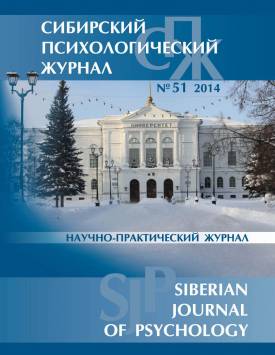Russian people's representations on major schools of psychology
The purpose of the research is to study the structure of social representations of Russians about the main schools of psychology (psychoanalysis, behaviorism, Gestalt psychology, humanistic psychology, cognitive psychology), and also to develop the models of social representations for reflexive and irreflexive levels of thinking. As a result of the research the thesaurus for each school of psychology has been composed. The thesaurus consists of the general terminology for the major psychology schools and the specific terminology for each psychology school. Besides the model of social representations on the major schools of psychology has been suggested. 115 people (the average age is 22 years old) took part in research. The associative experiment (an irreflexive level), methods of definitions and interviewing (a reflexive level) were used. All nouns were taken from the verbal material received from examinees, the frequency of their occurrence was calculated and those nouns which met at not less than 5% of examinees were selected. The selected nouns formed the general thesaurus for all schools, as well as the specific thesaurus for each of five schools and for every of the studied levels. On the basis of the qualitative analysis of the thesaurus three categories were revealed allowing systematizing a set of elements of all received thesaurus: a subject of activity, activity, an object of activity. These categories were interpreted as components of a model of social representations of Russians about the schools of psychology. It is established that the levels of representations (irreflex-ive and reflexive) differ according to the degree of representation of components of a model. For the reflexive level the contemplate two-component model (the Quasisubject (science) and the Object (person) with signs of a specification and a pertseptivization of components is revealed. At the irre-flexive level the activity model (there is the Subject of activity (psychologist) available to perception is received, rational and typological components of Quasiobject (reason, thoughts, thinking, character) are concretized, the practical and helping component of the Activity (the help, understanding, communication)) is detailed. The received data concerning the features of representations on psychoanalysis, allow clearing the specifics of functioning of the three main components of the model of social representations on the main schools of psychology. While the components of the model - the Subject and the Object appear initially, even at the minimum level of formation of social representations, the component - the Activity, the degree of its development and specification, acts as the indicator of achievement of a higher level of the formation.
Keywords
социальные представления, С. Московичи, психоанализ, методологический инструментарий, социальные представления о психоанализе у россиян, social representations, Serge Moscovici, psychoanalysis, methodological tools, social representation of psychoanalysis for RussiansAuthors
| Name | Organization | |
| Levchenko Elena V. | Perm State National Research University | levchenkoev@yandex.ru |
| Smirnova Irina V. | Perm State National Research University | ira89082510064@yandex.ru |
References

Russian people's representations on major schools of psychology | Sibirskiy Psikhologicheskiy Zhurnal – Siberian Journal of Psychology. 2014. № 51.
